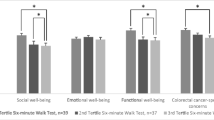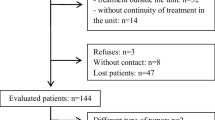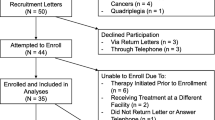Abstract
Purpose
The aim of this study is to determine the predictors of functional capacity and explore the relationship between functional capacity, performance status, fatigue, quality of life, anxiety, and depression in colorectal cancer (CRC) patients.
Methods
Forty-two patients diagnosed as stage II–III CRC according to tumor, node, metastasis (TNM) classification were included the study. Functional capacity, performance status, fatigue, quality of life, anxiety, and depression of CRC patients were assessed using six-minute walk distance (6MWD) in the six-minute walk test (6MWT), Eastern Cooperative Oncology Group Performance Status (ECOG-PS), Brief Fatigue Inventory (BFI), Functional Assessment of Cancer Therapy-Colorectal (FACT-C), and Hospital Anxiety and Depression Scale (HADS), respectively. A multiple linear regression model was used to identify independent predictors of functional capacity.
Results
The six-minute walk distance (6MWD) was intermediately and negatively correlated with ECOG-PS score (p = 0.001, r = −0.415), BFI-impact of fatigue on daily functioning score (p = 0.013, r = −0.379), and age (p = 0.040, r = −0.319). An intermediate and positive correlation was found between 6MWD and FACT-C score (p = 0.016, r = 0.369). The multiple regression analysis revealed that only ECOG-PS score was significant and independent predictor of the 6MWD, accounted for 34.8 % of the variance.
Conclusion
Performance status was found to be the only significant predictor of functional capacity in this study. Assessing performance status may have an essential role in order to predict functional capacity in CRC patients. Future studies that include a larger sample size would more clearly elucidate the predictors and relationships of functional capacity.
Similar content being viewed by others
References
IARC (2008) GLOBOCAN database. 2008, IARC
Jemal A, Siegel R, Xu J, Ward E (2010) Cancer statistics, 2010. CA Cancer J Clin 60(5):277–300. doi:10.3322/caac.20073
Sökmen S (2004) Kolorektal Kanserde Prognoz, Kolorektal Özel Sayısı. Turk J Surg 9:57–65
Matheson L (1996) Functional capacity evaluation. In: Andersson G, Demeter S, Smith G (eds) Disability evaluation. Mosby Yearbook, Chicago
Gibbons RJ, Ritchie JL, Cardiology ACo, Guidelines AHATFoP (2002) ACC/AHA 2002 guideline update for exercise testing. American College of Cardiology
Hewitt M, Greenfield S, Stovall E (2006) From cancer patient to cancer survivor: lost in transition. (trans: Committee on cancer survivorship: improving care and quality of life NCPB). Institute of Medicine and National Research Council, Washington DC
Travers J, Dudgeon DJ, Amjadi K, McBride I, Dillon K, Laveneziana P, Ofir D, Webb KA, O’Donnell DE (2008) Mechanisms of exertional dyspnea in patients with cancer. J Appl Physiol (1985) 104 (1):57–66. doi:10.1152/japplphysiol.00653.2007
Courneya KS, Friedenreich CM (2001) Framework PEACE: an organizational model for examining physical exercise across the cancer experience. Ann Behav Med 23(4):263–272
Norton K (2005) Sports Medicine Australia (SMA) pre-exercise screening system 2005. Sports Medicine Australia, Canberra
ATS Committee on Proficiency Standards for Clinical Pulmonary Function Laboratories (2002) ATS statement: guidelines for the six-minute walk test. Am J Resp Crit Care 166(1):111–117. doi:10.1164/ajrccm.166.1.at1102
Enright PL (2003) The six-minute walk test. Resp Care 48(8):783–785
Enright PL, Sherrill DL (1998) Reference equations for the six-minute walk in healthy adults. Am J Resp Crit Care 158(5 Pt 1):1384–1387. doi:10.1164/ajrccm.158.5.9710086
Oken MM, Creech RH, Tormey DC, Horton J, Davis TE, McFadden ET, Carbone PP (1982) Toxicity and response criteria of the Eastern Cooperative Oncology Group. Am J Clin Oncol Canc 5(6):649–655
Buccheri G, Ferrigno D, Tamburini M (1996) Karnofsky and ECOG performance status scoring in lung cancer: a prospective, longitudinal study of 536 patients from a single institution. Eur J Cancer (Oxford, England : 1990) 32A(7):1135–1141
Mendoza TR, Wang XS, Cleeland CS, Morrissey M, Johnson BA, Wendt JK, Huber SL (1999) The rapid assessment of fatigue severity in cancer patients: use of the brief fatigue inventory. Cancer 85(5):1186–1196
Azak A, Çınar S (2005) Lenfomalı (hodgkin ve non-hodgkin) hastalarda yorgunluk sendromu ve etkileyen faktörler. Turk J Hematol Oncol 15:78–83
Ward WL, Hahn EA, Mo F, Hernandez L, Tulsky DS, Cella D (1999) Reliability and validity of the Functional Assessment of Cancer Therapy-Colorectal (FACT-C) quality of life instrument. Qual Life Res Int Journal Qual Life Aspects Treatment, Care and Rehab 8(3):181–195
Özgüven HD, Köker S, Canat S (1997) Hastane anksiyete ve depresyon ölçeği’nin bir Ankara örnekleminde geçerlik ve güvenirliği. 3P (Psikiyatri Psikoloji Psikofarmakoloji) Dergisi 5:197–201
Aydemir Ö, Köroğlu E (2006) Psikiyatride kullanılan klinik ölçekler. Hekimler Yayın Birliği, Ankara
Aksakoğlu G (2006) Sağlıkta Araştırma ve Çözümleme, İkinci Yazım. D.E.Ü. Rektörlük Basım Evi, İzmir
Brooks D, Solway S, Gibbons WJ (2003) ATS statement on six-minute walk test. Am J Resp Crit Care 167(9):1287. doi:10.1164/ajrccm.167.9.950
Jones LW, Cohen RR, Mabe SK, West MJ, Desjardins A, Vredenburgh JJ, Friedman AH, Reardon DA, Waner E, Friedman HS (2009) Assessment of physical functioning in recurrent glioma: preliminary comparison of performance status to functional capacity testing. J Neuro Oncol 94(1):79–85. doi:10.1007/s11060-009-9803-x
Lederer DJ, Arcasoy SM, Wilt JS, D'Ovidio F, Sonett JR, Kawut SM (2006) Six-minute-walk distance predicts waiting list survival in idiopathic pulmonary fibrosis. Am J Resp Crit Care 174(6):659–664. doi:10.1164/rccm.200604-520OC
Shah MR, Hasselblad V, Gheorghiade M, Adams KF Jr, Swedberg K, Califf RM, O'Connor CM (2001) Prognostic usefulness of the six-minute walk in patients with advanced congestive heart failure secondary to ischemic or nonischemic cardiomyopathy. Am J Cardiol 88(9):987–993
Rasekaba T, Lee AL, Naughton MT, Williams TJ, Holland AE (2009) The six-minute walk test: a useful metric for the cardiopulmonary patient. Intern Med J 39(8):495–501. doi:10.1111/j.1445-5994.2008.01880.x
Li C, Carli F, Lee L, Charlebois P, Stein B, Liberman AS, Kaneva P, Augustin B, Wongyingsinn M, Gamsa A, Kim do J, Vassiliou MC, Feldman LS (2013) Impact of a trimodal prehabilitation program on functional recovery after colorectal cancer surgery: a pilot study. Surg Endosc 27(4):1072–1082. doi:10.1007/s00464-012-2560-5
Gustafsson M, Edvardsson T, Ahlstrom G (2006) The relationship between function, quality of life and coping in patients with low-grade gliomas. Supp Care Canc Offic J Multi Assoc Supp Care Canc 14(12):1205–1212. doi:10.1007/s00520-006-0080-3
Cheng KK, Lee DT (2011) Effects of pain, fatigue, insomnia, and mood disturbance on functional status and quality of life of elderly patients with cancer. Crit Rev Oncol Hemat 78(2):127–137. doi:10.1016/j.critrevonc.2010.03.002
Dodd MJ, Miaskowski C, Paul SM (2001) Symptom clusters and their effect on the functional status of patients with cancer. Oncol Nurs Forum 28(3):465–470
Sutradhar R, Atzema C, Seow H, Earle C, Porter J, Howell D, Dudgeon D, Barbera L (2014) Is performance status associated with symptom scores? A population-based longitudinal study among cancer outpatients. J Palliat Care 30(2):99–107
Lipscomb J, Gotay CC, Snyder CF (2007) Patient-reported outcomes in cancer: a review of recent research and policy initiatives. CA Cancer J Clin 57(5):278–300. doi:10.3322/ca.57.5.278
Huang ME, Wartella JE, Kreutzer JS (2001) Functional outcomes and quality of life in patients with brain tumors: a preliminary report. Arch Phys Med Rehab 82(11):1540–1546. doi:10.1053/apmr.2001.26613
Walsh D, Donnelly S, Rybicki L (2000) The symptoms of advanced cancer: relationship to age, gender, and performance status in 1,000 patients. Supp Care Canc Offic J Multi Assoc Supp Care Canc 8(3):175–179
Bodurka-Bevers D, Basen-Engquist K, Carmack CL, Fitzgerald MA, Wolf JK, de Moor C, Gershenson DM (2000) Depression, anxiety, and quality of life in patients with epithelial ovarian cancer. Gynecol Oncol 78(3 Pt 1):302–308. doi:10.1006/gyno.2000.5908
Miaskowski C, Cooper BA, Paul SM, Dodd M, Lee K, Aouizerat BE, West C, Cho M, Bank A (2006) Subgroups of patients with cancer with different symptom experiences and quality-of-life outcomes: a cluster analysis. Oncol Nurs Forum 33(5):E79–E89. doi:10.1188/06.onf. e79-e89
Park BW, Hwang SY (2012) Unmet needs and their relationship with quality of life among women with recurrent breast cancer. J Breast Canc 15(4):454–461. doi:10.4048/jbc.2012.15.4.454
Humpel N, Iverson DC (2007) Depression and quality of life in cancer survivors: is there a relationship with physical activity? Int J Behav Nutr Phy 4:65. doi:10.1186/1479-5868-4-65
Turner J, Hayes S, Reul-Hirche H (2004) Improving the physical status and quality of life of women treated for breast cancer: a pilot study of a structured exercise intervention. J Surg Oncol 86(3):141–146. doi:10.1002/jso.20065
Stone P, Hardy J, Broadley K, Tookman AJ, Kurowska A, A'Hern R (1999) Fatigue in advanced cancer: a prospective controlled cross-sectional study. Brit J Canc 79(9–10):1479–1486. doi:10.1038/sj.bjc.6690236
Thong MS, Mols F, Wang XS, Lemmens VE, Smilde TJ, van de Poll-Franse LV (2013) Quantifying fatigue in (long-term) colorectal cancer survivors: a study from the population-based patient reported outcomes following initial treatment and long term evaluation of survivorship registry. Eur J Cancer (Oxford, England : 1990) 49(8):1957–1966. doi:10.1016/j.ejca.2013.01.012
Maisey NR, Norman A, Watson M, Allen MJ, Hill ME, Cunningham D (2002) Baseline quality of life predicts survival in patients with advanced colorectal cancer. Eur J Cancer (Oxford, England : 1990) 38(10):1351–1357
Curt GA, Breitbart W, Cella D, Groopman JE, Horning SJ, Itri LM, Johnson DH, Miaskowski C, Scherr SL, Portenoy RK, Vogelzang NJ (2000) Impact of cancer-related fatigue on the lives of patients: new findings from the Fatigue Coalition. Oncologist 5(5):353–360
Jacobsen P, Weitzner M (2003) Evaluating the relationship of fatigue to depression and anxiety in cancer patients. In: Portenoy R, Bruera E (eds) Issues in palliative care research. Oxford University Press, New York, pp 127–150
Winell J, Roth AJ (2004) Depression in cancer patients. Oncology (Williston Park, NY) 18(12):1554–1560, discussion 1561-1552
Piper B (2003) Fatigue. In: Kohlman-Carrieri V, Lindsey A, West C (eds) Pathophysiological phenomena in nursing, human responses to illness, 3rd edn. Saunders Company, pp 209–235
Acknowledgments
No funding was received for this manuscript. We thank all patients for their participation in the study. Special thanks to DEU Department of Medical Oncology and Radiation Oncology for their cooperation.
Conflict of interest
The authors have no conflicts of interest to declare.
Author information
Authors and Affiliations
Corresponding author
Rights and permissions
About this article
Cite this article
Tomruk, M., Karadibak, D., Yavuzşen, T. et al. Predictors of functional capacity in colorectal cancer patients. Support Care Cancer 23, 2747–2754 (2015). https://doi.org/10.1007/s00520-015-2639-3
Received:
Accepted:
Published:
Issue Date:
DOI: https://doi.org/10.1007/s00520-015-2639-3




